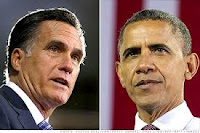
Monday, November 05, 2012
(wsj)
Google Inc.'s quest to guess what we want before we want it has produced an unusual side effect: a disparity in the results the company presents about the presidential candidates.
A Wall Street Journal examination found that the search engine often customizes the results of people who have recently searched for "Obama"—but not those who have recently searched for "Romney."
Here's how it works: When a user searches for the name Obama, Google includes links about President Barack Obama in subsequent searches on terms such as "Iran," "Medicare" and "gay marriage." The altered results are labeled in gray type: "you recently searched for Obama."
Testers searching for "Romney," however, didn't see customized links containing Republican presidential challenger Mitt Romney's name in their subsequent search results.
The search links are altered only for a short period, and there is no indication that Google is intentionally biasing its results. Nor does the pattern affect only political topics: Searches for words such as "iPhone," "sports," "health," "social security" and "twilight" also can trigger customized results in subsequent searches.
In September, Gabriel Weinberg, founder and chief executive of tiny Duck Duck Go Inc., which markets itself as a privacy-protecting search engine, stumbled across the "you recently searched for" phenomenon in a study he conducted of Google's personalization efforts. Mr. Weinberg, whose site is based in Paoli, Pa., asked 131 of its users to search Google for several keywords at 2 p.m. Eastern time on Sept. 2: "Obama," "abortion" and "gun control." His testers received a wide variety of different results that appeared to be personalized by location and other factors.
Mr. Weinberg also noticed that some testers received results labeled "you recently searched for Obama," and discovered that he couldn't replicate the same label when searching for Romney. Mr. Weinberg brought the discrepancy to the Journal's attention.
To determine the impact of Google's new personalization approach, the Journal analyzed searches conducted by 62 testers who were using Amazon's Mechanical Turk service. Mechanical Turk is an electronic marketplace where workers can sign up to perform small tasks for a small fee. The Journal used a company called Houdini Inc. that provides tools for managing crowdsourcing projects.
Testers searched for "Iran," "Medicare" and "Gay marriage" after searching for "Obama," "Romney" or for the keyword "election."
After searching for Obama, about 80% of the testers subsequent search results were altered to contain links containing the words "Obama." Searchers for "election," saw about 25% of their subsequent search results customized to contain links containing the word "election." Testers searching for "Romney" didn't see customized links containing the word Romney in their subsequent search results...
(more)
0 Comments:

